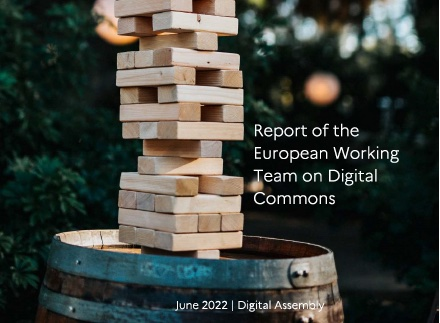- "The "digital commons" are produced by a community according to rules defined by itself, such as Wikipedia, Linux or OpenStreetMap. By relying on collective intelligence, knowledge networking and international collaboration, digital commons challenge the lock-in strategies pursued by some governments and large digital service providers. At the heart of the digital value chain, they bring more security and drive innovation. Strengthening the digital commons is thus an essential lever of sovereignty for the European Union and all states.
On the occasion of theDigital Assembly co-organized in Toulouse on June 21 and 22 by the French Presidency of the Council of the European Union and the European Commission, the report on the digital commonsThe report on the digital commons, initiated by France during the conference "Building Europe's Digital Sovereignty" held on February 7 and 8, was presented to the participants.
The report makes four proposals:
- the creation of a European one-stop shop to guide communities towards adequate funding and public aid;
- the launch of a call for projects to rapidly deploy financial assistance to the most strategic commons;
- the creation of a European foundation for the digital commons, with shared governance between the States, the European Commission and the digital commons communities;
- the implementation of the "digital commons by default" principle in the development of digital tools for public administrations.
The Union is becoming increasingly mature on Free and Open Source Software issues (excerpts from the executive summary)
Europe is the cradle of a free, open, neutral, interoperable and secure Internet, which is also the greatest digital commons. These funding principles are at the heart of the European Union's values, anchored in the European treaties and underlined in the Declaration on European Digital Rights and Principles. Alongside its member states, the Union is becoming increasingly mature on the issues of Free and Open Source Software (FLOSS) and the digital commons. They have increasingly taken the measure of the tremendous opportunities offered by these models. The EU's Digital Agenda aims to ensure the digital transformation of people and businesses, while contributing to its goal of a climate neutral Europe by 2050. The Commission is committed to financially supporting the Internet Commons and technology building blocks through the Next Generation Internet (NGI), which is the main European program to support technology building blocks.The European Union's institutions, bodies and agencies are not the only ones to favor open source software and digital commons in their internal IT architecture. Many public services across Europe have chosen to rely on these sovereign technologies (...) . In some cases, governments have decided to mandate the use of FOSS and open source software. More significantly, European governments are spearheading the global promotion of technologies based on the fundamental principles of the Internet. The launch of the GovStack initiative, or the United Nations Digital Public Goods Alliance are two examples of European leadership in this area. (...) The Interim Task Force found a lack of infusion of the culture of the commons into public policy.Report outline
IntroductionExecutive Summary
A wealth of initiatives underway- National projects
- European initiatives
- International alliances and foreign initiatives
- International alliances
- Private efforts
- Limitations of existing initiatives
- Lack of coordination between existing initiatives
- E-government centric solutions: brake or drive belt
- Meeting the challenge with a European flagship program
- Create a one-stop shop for the digital commons
- Launch of a call for proposals
- Establishing a European Foundation for the Digital Commons 29
- The digital commons first
The report is the result of work carried out by 19 Member States (Belgium, Croatia, Czech Republic, Denmark, Estonia, Finland, Germany, Ireland, Italy, Latvia, Luxembourg, Malta, Netherlands, Poland, Portugal, Slovenia, Spain, Sweden) and the European Commission.
Références :





